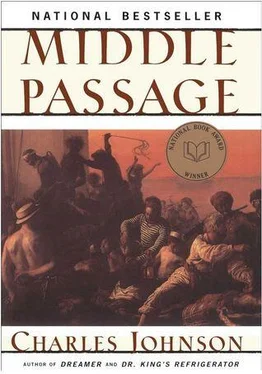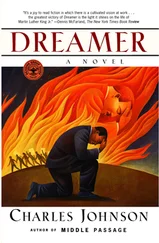After the gin, five pitchers of beer emptied before me; the sailors thinned out, but still I sat, knowing that each hour brought me closer to the bondage of wedlock. Behind me, I heard first a burp, then the gravelly voice of the now drunken sailor in shag trousers. “Yo-ho, there, young un!” He held up a flagon of grog, his fifth, which he’d only half finished. “Ye can take this, my dear, if you’ve a mind to. Josiah Squibb’s had enough for one night.”
“Much obliged. . Squibb, is it?” I took his flagon in my left hand and his thick, rough hand in my right. “You’ve put away quite a lot. A man would think you’re going to a hanging, friend.”
“Worse,” said Squibb. “I’m shipping out tomorrow with Captain Ebenezer Falcon. Good as a hangin’, that, to hear some men tell it. He’s a descendant of Colonel Blood who stole the crown jewels, some say, a buccaneer at heart, and proud of it.” Blearily he lit a long-shanked pipe and studied me through eyes too bloodshot, really, to see. “Ye drink a lot y’self, boy. Got problems, have ye?”
“Marriage,” I told him. “Tomorrow at noon.”
“Blimey!” Squibb sat back, stunned, his chair creaking. “Ye have got a problem. Oh, I know about wives all right. Got a couple myself — one in Connecticut, and one in Vermont. That’s why I ship out. What say I buy yuh a round?”
Josiah Squibb, I learned, had signed on as a cook aboard the Republic, a ninety-ton square-rigger that would up-anchor and sail eastward against the prevailing winds to the barracoon, or slave factory, at Bangalang on the Guinea coast, take on a cargo of Africans, and then, God willing, return in three months. “There she be.” Squibb stabbed his pipestem toward the window, and the ship he showed me from this distance was strikingly beautiful, a great three-masted, full-rigged bark with a roundtuck hull, grated hatches and bulkheads cut round the deck for circulation. As it turned out, these were the last words from Squibb. Halfway through our last drink, his forehead crashed down upon the table. And his papers. . ah, these were rolled cylindrically inside his right boot. I thought, Naw, Calhoun, you can’t do that, but at that selfsame instant I remembered what awaited me at the altar, and I decided most definitely, Yes, I can.
“Bad move,” said the parrot. “Very bad move.”
I said, “Shut up.”
Transferring Squibb’s papers to my coat, I eased away from the table whilst he snored. “Thief! Thief!” shouted the parrot, but fortunately he could not shatter the cook’s heavy-headed sleep. I slipped outside into a shock of cool air and ran down the pier to a cluster of small boats rocking lazily to and fro on the water. I unfastened the rope to one, paddled out toward the Republic, then hauled myself hand over hand up a rope ladder to the topgallant bulwark, and over onto a broad empty deck. The crew had not come aboard yet. Standing aft, looking back at the glittering lights ashore, I had an odd sensation, difficult to explain, that I’d boarded not a ship but a kind of fantastic, floating Black Maria, a wooden sepulcher whose timbers moaned with the memory of too many runs of black gold between the New World and the Old; moaned, I say again, because the ship — with its tiered compartments and galleys, like a crazy-quilt house built by a hundred carpenters, each with a different plan — felt conscious and disapprovingly aware of my presence when I pulled back the canvas on a flat-bottomed launch and laid myself down in its hull, which was long and narrow, both hands crossed on my chest. And then waves lapping below the ship gently swung me left then right as in a hammock, sinking me like a fish, or a stone, farther down through leagues of darkness, and mercifully to sleep.
Entry, the second JUNE 20, 1830
It wasn’t the Republic sailing east for the Gulf of Guinea, skimming along easily in a six-knot breeze, that awoke me (I’ve been known to sleep through gunshots and tavern brawls), or even the chatter of Captain Falcon’s flea-infested, foul-tongued crew, but rather the cold barrel of a pistol shoved under my shirt and against my belly by Peter Cringle, the first mate and quartermaster, that brought me back to full consciousness from the deepest sleep I’d known in years. An hour out of port, Cringle had thrown back the tarp fashioned from old sail, uncovering me, and I stared up — my mouth and eyes partly sealed and phlegmed by sleep — at a silvery-gray sky aswirl with honking sea gulls, the elaborate webbing of the foremast entangled with low-bellying clouds, and the faces of five men you’d hardly care to stumble upon during an evening stroll: black eyepatches, I saw, beards like tangled bushes, hooks where hands should be — I speak the truth — and they had, like the monocular witches outwitted by Perseus, only two good teeth among them all. “A black stowaway, is he now, Mr. Cringle?” said one, whose mouth could have doubled for the Black Hole of Calcutta. “Let us ’ave him, sir. We’ll throw the blighter overboard and save you the powder — we wouldn’t want you exertin’ yerself too much, y’know, you bein’ first mate and all.”
Laughter exploded round me, but the mate’s expression did not change.
“On your feet, you,” Cringle ordered, and I obeyed because of all the faces present his seemed the most sympathetic. In other words, his was the only one not pitted by smallpox, split by Saturday night knifescar, disfigured by Polynesian tattoos, or distorted by dropsy. Indeed, First Mate Cringle’s whole air spoke of New England gentility. He was tall and straight as a ship’s door, a gentleman from his unwrinkled shirt right down to the spit-polished boots that reflected back winces and deadeyes on deck. His skin was as white as wax, which made him seem like nothing less than a tightly wound toy soldier. “You’ve less than a minute,” said he, shaking with rage, or more like fear, “to explain what you’re doing aboard this ship.”
Quickly I pulled Squibb’s papers from my waistcoat, unfolded them, then thrust them toward him. “I didn’t mean to be asleep, sir,” I said, maneuvering. “I’m ready now to report for work.”
Cringle frowned irritably down the first page. The other sailors, that blustering, braying gang of tormentors, looked over his shoulder like an infernal chorus and seemed to enjoy the agitation my discovery brought him; they watched him more closely than they watched me, elbowing each other and winking, like bullies having fun at the expense of a new boy — a sissy in short pants — at school. Above us birds veered, then vanished into diaphanous layers of mist high as the mizzenpole. The deck was silent, so quiet I could hear blood hammering in my ears and the hungry gurgle of gastric fluids in my belly. At length Cringle shut his eyes. He crumpled the papers in his fist.
“Josiah Squibb is down below, you bloody impostor!”
“Oh.” My breath stopped. “Odd coincidence, that. Imagine! Two of us with the same na—” He leveled the firelock straight at my forehead, but less to frighten me, I thought, than to make a point with the others. “Sir, my name isn’t Squibb. You’ve guessed that already? Uh, right. It’s Rutherford Calhoun, and I only came aboard to return these papers to—”
“Hold your tongue.” He faced around to the others. “And stop your row, all of you, and get back to work. I can handle this myself.”
Under Cringle’s stare the crew turned back, laughing less at me than at the mate, to their business — belaying sheets and halyards — and Cringle’s bunched shoulders lowered a little. He put away his pistol, wiped his forehead with his sleeve, whispered, “Hoodlums, every one of them,” then shoved me toward Captain Falcon’s cabin. “It’s the Devil, I do believe, that sends us the bloody flux, contrary winds, and rumpots like these!” We passed small pens of chickens and Berkshire pigs the captain kept on board for himself, but as we neared the cabin door my stomach dropped. I felt uneasy in my spine. Sweat began to stream into my clothes. The deck beneath me dipped and rose dizzily, and with that motion my center of gravity was instantly gone. My last meal, too, over the railing, which I ran to and gripped with all my strength as the ship — or so my confused inner ear told me — careened left. “Now, that’s a pretty sight. And you say you’re a sailor, eh? I think you’re a farmer, Calhoun.”
Читать дальше












